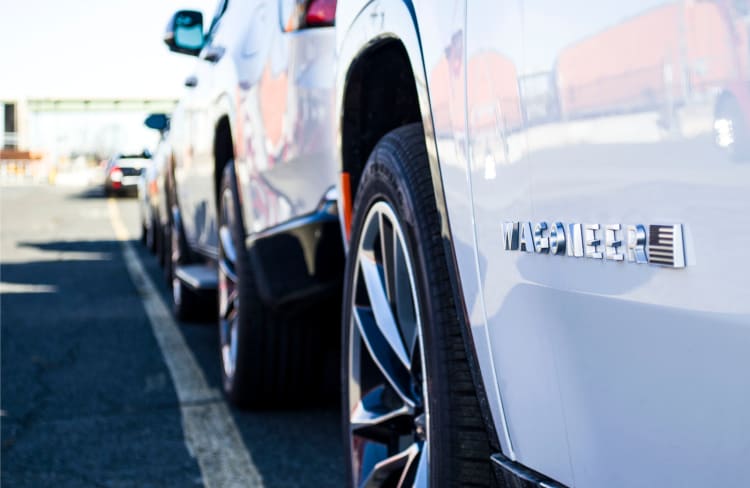What Is a Lien on a Car?
Liens are an important concept for borrowers to understand as they can put your assets at risk if you default on a loan. The following guide explains car liens so you can learn how it impacts buying, selling, and owning a car.
Read time
7 minutes
Date
09.25.2023
Share
While not the most glamorous legal topic, liens are an important concept for borrowers to understand, as they can put your assets at risk if you default on a loan. A lien on a car is a form of security interest or legal claim on the vehicle by a lender, such as a bank or credit union that provided financing to purchase the car. But, liens can create headaches for car buyers by allowing lenders to seize vehicles when loans go unpaid.
That's why a car subscription from FINN provides a safer alternative. By subscribing to a car through FINN's extensive inventory rather than buying, you can avoid liens attached to your next vehicle.
Find your next car with FINN
What exactly is a lien?
A lien is a legal claim or security interest that a lender or creditor has on an asset or property belonging to a borrower or debtor. Liens give the creditor the right to seize the asset if the debtor fails to repay their loan or meet the obligations of the agreement. Common assets that liens are placed on include real estate, vehicles, equipment, inventory, and receivables.
Liens are usually created as part of a loan contract and remain attached to the asset even if ownership changes. The lien must be removed, often by paying off the debt, before full ownership transfers to a new buyer. Liens protect the creditor by allowing them to repossess or foreclose on secured assets if the debtor defaults on repayment.
Is a lien the same as a loan?
While they are related concepts, a lien and a loan are not the same thing. The following table breaks down the key distinctions:
Lien | Loan | |
Definition | A legal claim or security interest attached to an asset as collateral for a loan. | An amount of borrowed money that must be repaid with interest. |
Purpose | Provides the lender with security and the right to repossess/sell the encumbered asset if the associated loan goes into default. | Provides the borrower with financing to purchase or pay for something. |
Role | Acts as collateral on a loan. | Represents a debt that must be repaid. |
Timeline | Remains attached to an asset until the associated loan is fully paid off. | Money is borrowed for a set period of time, usually with a repayment schedule. |
Ownership | Does not transfer ownership or title - only provides the lender with a secured interest. | The borrowed money belongs to the borrower once the loan is taken out. |
Removal | Lien is removed once the loan is fully satisfied. | Loan obligation ends once the debt is fully repaid. |
What is a lien on a car?
A lien on a car is a legal claim on the vehicle that gives a lender certain rights until the c is paid off. There are some key points about car liens:
- When you finance a car purchase through an auto loan, the lender files a lien on the car's title. This attaches the lien to the vehicle as collateral for the loan.
- The lien is recorded with the DMV to make it officially binding. It appears on the vehicle's title documentation.
- The lienholder (usually a bank or credit union) has the right to repossess and sell the car if the loan goes into default due to missed payments.
- The car's title shows the lienholder's name and remains in "lienholder" status until the loan balance is paid in full.
- You cannot sell or trade in the vehicle until the lien is cleared, since the lender's claim has priority.
- Refinancing the loan may replace the lienholder but a lien remains active until the loan is satisfied.
- When the loan is paid off, the lender releases the lien and the owner receives a clean title confirming full ownership.
Types of liens on a car
The most common lien on a car is a security interest lien, filed by the lender when financing the purchase. This gives them the right to repossess the vehicle if loan payments cease. Other potential liens include:
- Mechanic's lien: Placed by a repair shop if mechanical bills go unpaid. Prevents transferring ownership until paid.
- Tax lien: Issued by the government for failure to pay taxes associated with the vehicle.
- Judgment lien: Ordered by a court if you lose a lawsuit and don't pay damages owed. Allows seizure of the car.
- Storage lien: Imposed by a storage facility if you abandon a vehicle and owe rent.
- Equitable lien: A secondary lien filed by a lender who failed to properly record initial security interest in the car loan.
Rather than feeling shackled to a car with an outstanding lien, a car subscription like FINN gives you more options. The flexible car subscription model lets you switch vehicles anytime without long-term commitments. This lien-free approach makes it easy to shake things up if your needs change after six months, unlike being locked into years of loan payments.
What is a lienholder on a car title?
A lienholder on a car title refers to the lender that financed the vehicle's purchase and retains a security interest in it. This is typically the bank, credit union, or other financial institution that provided the auto loan. They hold a lien on the car until the loan is fully repaid.
The lienholder is listed on the title documentation filed with the DMV. They have the legal right to repossess and sell the car if the buyer stops making loan payments. While an active lien exists, the title remains in "lienholder" status, restricting transfers of ownership. Only when the loan is satisfied will the lienholder release their claim, granting a clean title.
Buying or selling a car with a lien
What to know about buying a car with a lien
Buying a car that already has a lien can be difficult. If you want to purchase a used car that has an existing lien, these are some important aspects for you to take into consideration:
- The lienholder still has a legal claim on the vehicle until the loan is paid off. Their name will be on the title.
- You cannot fully register the car until the lien is settled and the title is cleared.
- The seller should provide documentation on the lien terms like payment amount and payoff date.
- You can choose to take over the payments or pay off the lien as part of the sale.
- Refinancing the loan may be an option to remove the existing lienholder.
- Be wary of potential issues down the road if the prior owner defaults on the loan.
What to know about selling a car with a lien
Selling a car that already has a lien can become a challenge. If you sell a car that still has an outstanding loan, you will need to coordinate the following with the lienholder:
- The buyer will need to get loan details to determine if they can take over payments.
- You usually cannot sell for more than you owe on the loan balance.
- The lienholder must release the lien once the loan is settled, either via a payoff or the buyer assumes the payments.
- Having a lien makes it harder to find buyers willing to inherit someone else's loan.
- Selling the car out from under the lienholder without their consent constitutes default.
So it's best to satisfy the lien fully first before attempting to sell a vehicle if possible.
What if your car has a lien?
If your car currently has a lien, you have a few options to consider. For instance, you can continue making loan payments as usual until the lien is removed once the balance is paid off. Other options include paying off the lien entirely if you have the funds, refinancing the loan potentially at a better rate, or trading in the car with negative equity towards a new purchase. You may also have some luck finding an individual private party buyer willing to take over your existing auto loan.
However, rather than remaining tied down to a vehicle with a lien, you could explore alternative mobility services. Companies like FINN allow you to subscribe to cars with no long-term commitment required. This provides more flexibility if you want to switch cars or discontinue your subscription after only six months versus being locked into loan payments.
Final thoughts
While liens may seem like dull jargon, understanding how they work is crucial for car owners and buyers alike. Liens give lenders a legal foothold on your vehicle as collateral until loans are fully repaid—miss payments, and your car could get repossessed.
But for savvy consumers, alternatives like a FINN car subscription offer smart new options. By subscribing to a car for six to 12 months, rather than taking out auto loans, you stay flexible and lien-free. No more being shackled to a car you no longer want or fretting over hidden lien surprises. FINN lets you find your perfect ride, ditch it for something new after only a few months, and never get stuck with liens dragging you down.


Final thoughts
While liens may seem like dull jargon, understanding how they work is crucial for car owners and buyers alike. Liens give lenders a legal foothold on your vehicle as collateral until loans are fully repaid—miss payments, and your car could get repossessed.
But for savvy consumers, alternatives like a FINN car subscription offer smart new options. By subscribing to a car for six to 12 months, rather than taking out auto loans, you stay flexible and lien-free. No more being shackled to a car you no longer want or fretting over hidden lien surprises. FINN lets you find your perfect ride, ditch it for something new after only a few months, and never get stuck with liens dragging you down.
You may also like

Can You Buy a Car With a Debit Card?
You use your debit card all the time, but can you buy a car with it? Learn more about buying a car with your debit card and the perks of subscribing to FINN.

Rebuilt Title vs. Salvage Title: What's the Difference?
Purchasing a used car often saves you money as it avoids the initial depreciation. But what about cars with rebuilt or salvage titles? Find out what these titles mean and if the initial discount is worth it in the long run.

How to Pay Off a Car Loan Faster
Figuring out how to pay off a car loan faster requires math and critical thinking. Read on to see how to pay off your car loan quickly to get out of debt.








